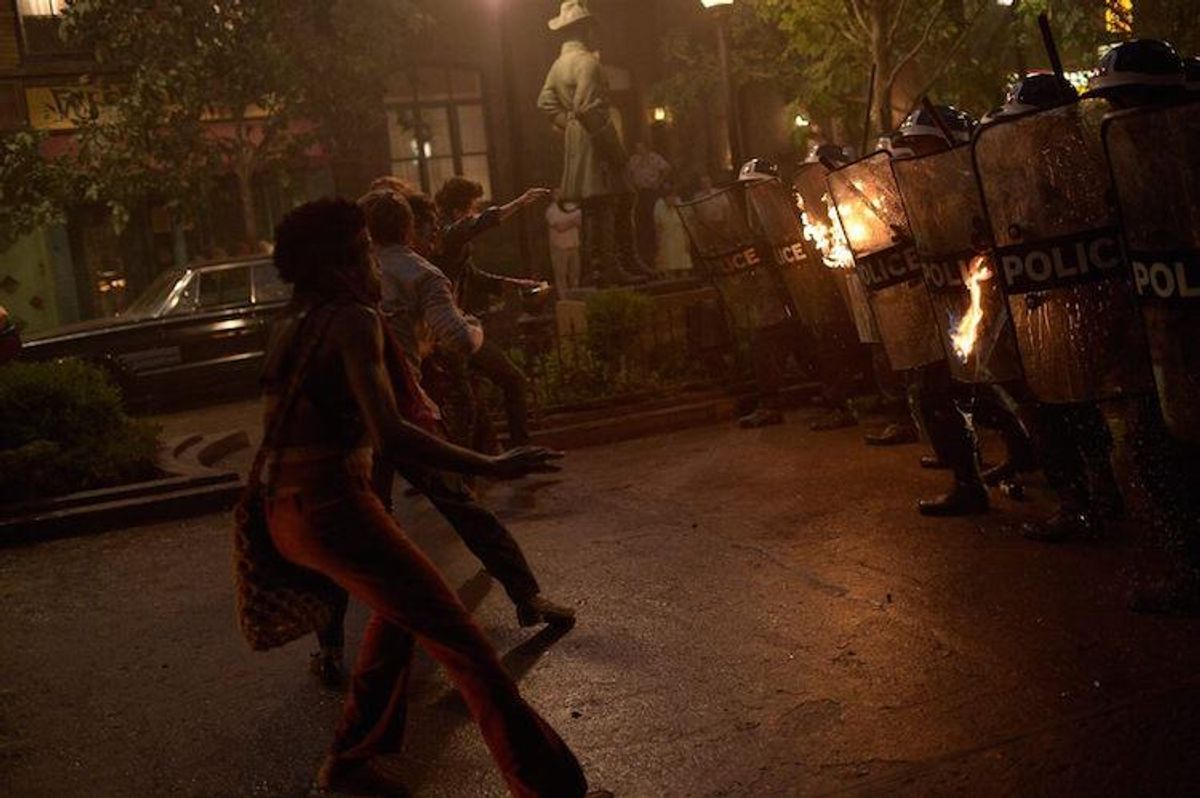
How Roland Emmerich turned gay history into fantasy
September 25 2015 10:00 AM EST
May 01 2018 11:57 PM EST
By continuing to use our site, you agree to our Private Policy and Terms of Use.

How Roland Emmerich turned gay history into fantasy
The Stonewall riots of June 28, 1969, were not a bus-and-truck production of Rent, but in Stonewall that's how Roland Emmerich both misconstrues and misrepresents it--deliberately, it seems. Instead of recreating history, Emmerich fantasizes about it, romanticizes it, and theatricalizes it. He's getting jumped-on for it, too. And rightly so.
But before you jump too hard, think about Emmerich's presumptions--and those of his screenwriter Jon Robin Baitz. One knows the tricks of popcorn cinema (from Independence Day, Godzilla, and The Patriot) and the other is well-versed in Broadway pandering. No surprise they came up with a Stonewall history that is insultingly phony. What does it say about how the new Millennium regards the past? And how gays look back on foundational principles, politics, and humanity?
Emmerich's protagonist Danny Winters (Jeremy Irvine, from Spielberg's War Horse) is referred to as a Ken Doll, but he's also a blond/blue gay porn ideal--like a Mark Dalton sprung ripe and easily-had from Indiana into New York City. As a fresh-faced Columbia University student, Danny typically embodies Hollywood's race-based audience identification. The street trash he implausibly befriends display ethnic and sexual diversity: blacks, latinos, drag queens, hookers, and the homeless.
It's a cynical, strictly commercial viewpoint, as offensive as the hip-hop movie Straight Outta Compton that equated black ne're-do-wells to political dissidents. The superlative 1995 film Stonewall, directed by Nigel Finch and written by Rikki Beadle Blair, highlighted the rebellion's ethnic and gender outcasts while Emmerich and Baitz credit that bold history to its white benefactors. It's a power move.
We're at a terrible place in political awareness when even the gay past is distorted to make a fashionable point rather than a historical truth. Emmerich presents Stonewall as flippantly as Rent because he aims at the part of gay culture that is as superficial, uninquiring and biased as straight culture. Cute Jeremy Irvine isn't here to win hearts and minds; he's on screen as a Ken Doll who stirs libidinal fantasies that override social imperatives.
Is a whiteboy protagonist needed to commemorate gay history and win sympathy? Emmerich and Baitz think they can get away with putting a gaggle of destructive, thieving, odd-ball minorities into the film's background. ("Minority" being a term describing the unempowered and despised.) Stonewall should oppose such thinking. The non-white characters still look like 21st century freaks (although one tall black drag queen takes a patronizing "defiant" stance).
Stonewall doesn't celebrate the defiance of outcasts. It condescends to Danny's first New York lover, Mattachine Society activist Trevor (a dark-haired Jonathan Rhys-Meyers) who represents a cowardly version of gay protest. (Trevor's comrade advises: "If we put on a suit, this is how we win.") Whoa! Condemning assimilation in today's era of gay assimilation/acceptance--as if the earnest Mattachine generation had no other option--is simply uncharitable.
Emmerich plays an ageist game for Millennials ("These kids have nothing left to lose") and he lacks the '95 film's realness which made freakdom poignant. Finch and Blair avoided toying with white supremacist Ken Dolls; their Mafia thug and black drag queen romantic subplot complicated how both gays and their exploiters were oppressed.
Stonewall dulls an exciting history (glum imagery doesn't help). It denies the multiplicity of gay experience so that even pathetic johns looking to blow equally destitute hustlers; horny, vicious cops; and freaky predators (an obese drag queen who quotes "I Love Lucy" and the Bible) aren't given enough realness. They all are denied empathy and lose their connection to modern, aggrieved humanity.
It's strange that Ron Perlman as a Stonewall gangster who forces Danny into prostitution resembles rough-trade porn star Rocco Steele. The line between historical truth and contemporary prurience is laughably blurred. Somehow Emmerich and Baitz pretend that gay social struggle was all in the past like the bohemians in Rent. They neglect the ongoing struggle to believe in one's own humanity among the high and low oppressed and contrive Stonewall history as clueless straights would.
Stonewall is in theaters now. Watch a clip from the film below: